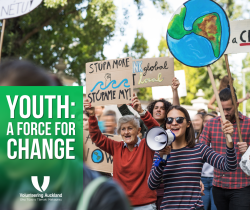A Force for Change and Sustainability: The Role of Youth in Volunteering & Activism

Youth in New Zealand have played an increasingly pivotal role in volunteering and activism since the 1990s, becoming a driving force for social change, environmental protection, and community development.
As global and local challenges have evolved, so too has the involvement of young people in addressing these issues, particularly in the realms of social justice, environmental sustainability, and climate activism.
This article explores the significant contributions of New Zealand youth to volunteering and activism from 1990 to the present, highlighting their role as change-makers in society.
The 1990s: A New Era of Youth Engagement
The 1990s marked a shift in the way young people in New Zealand engaged with social issues. This period saw the rise of a more globalized and interconnected world, where information and ideas could be shared rapidly through emerging digital technologies. For New Zealand youth, this meant greater awareness of global issues such as human rights, environmental degradation, and economic inequality, which in turn inspired local action.
Youth-led organisations and initiatives began to emerge, focusing on a range of social causes. The establishment of groups like the New Zealand Aotearoa Adolescent Health and Development (NZAAHD), which later became Youthline, highlighted the growing emphasis on youth empowerment and mental health. These organisations not only provided vital services to young people but also created spaces for youth to volunteer and contribute to their communities.
The 1990s also saw the beginning of a more organized approach to youth volunteering. Schools, universities, and community organisations increasingly encouraged young people to engage in volunteer work, both as a way to gain experience and as a means of contributing to society. This laid the foundation for a culture of youth volunteering that would continue to grow in the following decades.
The 2000s: Expanding Horizons and Building Networks
As the new millennium began, the scope and scale of youth volunteering and activism in New Zealand expanded. The early 2000s saw the rise of global movements that resonated with young New Zealanders, such as the anti-globalization protests and the push for fair trade. These movements emphasized the interconnectedness of global issues and the role that local action could play in creating change.
In New Zealand, youth were increasingly involved in volunteer efforts that addressed both local and global challenges. The rise of environmental consciousness among young people led to the formation of numerous environmental groups, such as Generation Zero, which was founded in 2011. This youth-led organisation focused on advocating for climate action and sustainable urban planning, reflecting the growing concern among young people about the impact of climate change.
The 2000s also saw the emergence of digital activism, with social media becoming a powerful tool for organizing and mobilizing youth. Platforms like Facebook, Twitter, and later Instagram allowed young activists to connect with like-minded individuals, share information, and coordinate events and campaigns. This digital shift made activism more accessible and allowed youth movements to gain momentum quickly.
The 2010s: Climate Activism Takes Center Stage
The 2010s were defined by the growing urgency of climate change and the role of youth in demanding action. The global climate movement, spearheaded by figures like Greta Thunberg, inspired young people around the world, including in New Zealand, to take to the streets and demand meaningful climate policies.
In New Zealand, the School Strike for Climate (SS4C) movement gained significant traction, with thousands of students participating in strikes and protests across the country. The movement highlighted the frustration of young people with the lack of government action on climate change and their desire for a sustainable future. These strikes were not just about raising awareness; they were about demanding tangible policy changes to reduce carbon emissions and protect the environment for future generations.
Youth involvement in climate activism also extended beyond protests. Many young New Zealanders became involved in local environmental projects, such as tree planting, beach clean-ups, and conservation efforts. Organisations like the Sustainable Coastlines Charitable Trust provided opportunities for young people to volunteer in hands-on environmental work, further deepening their commitment to sustainability.
In addition to environmental activism, the 2010s saw youth engagement in social justice issues, such as the fight for LGBTQ+ rights, gender equality, and the decolonization of education and institutions. Young people were often at the forefront of these movements, using social media to amplify their voices and push for systemic change.
The 2020s: A New Decade of Challenges and Opportunities
The 2020s have brought new challenges and opportunities for youth volunteering and activism in New Zealand. The COVID-19 pandemic had a profound impact on the world, disrupting lives and exacerbating existing inequalities. However, it also highlighted the resilience and adaptability of young people.
During the pandemic, many young New Zealanders stepped up to volunteer in their communities, helping to deliver food and essential supplies to vulnerable populations, supporting mental health initiatives, and contributing to public health campaigns. This period underscored the importance of youth in responding to crises and their ability to mobilize quickly in times of need.
Climate activism has continued to be a major focus for young people in New Zealand in the 2020s. The SS4C movement has evolved, with youth activists increasingly engaging with policymakers and local governments to advocate for stronger climate action. Young people are also playing a crucial role in promoting climate education, ensuring that future generations are equipped with the knowledge and skills to address environmental challenges.
In addition to climate activism, youth in New Zealand are increasingly involved in issues of social justice, particularly in the areas of racial equality, Indigenous rights, and mental health. The Black Lives Matter movement, for example, resonated strongly with young people in New Zealand, leading to widespread protests and discussions about racism and inequality in the country. Young Māori activists have also been at the forefront of efforts to address the impacts of colonization and promote the rights and sovereignty of Māori communities.
Conclusion: The Power of Youth in Shaping the Future
The role of youth in volunteering and activism in New Zealand since 1990 has been transformative. Young New Zealanders have shown a deep commitment to addressing the most pressing issues of their time, from climate change to social justice, and have become leaders in their communities and on the global stage. Their activism is characterised by a strong sense of urgency, creativity, and a willingness to challenge the status quo.
As New Zealand continues to navigate the complexities of the 21st century, the contributions of its youth will remain critical. Their energy, passion, and vision for a better world are essential in driving the social and environmental change needed to create a more just, equitable, and sustainable future for all. The legacy of youth activism in New Zealand is a testament to the power of young people to shape the course of history and build a better tomorrow.

